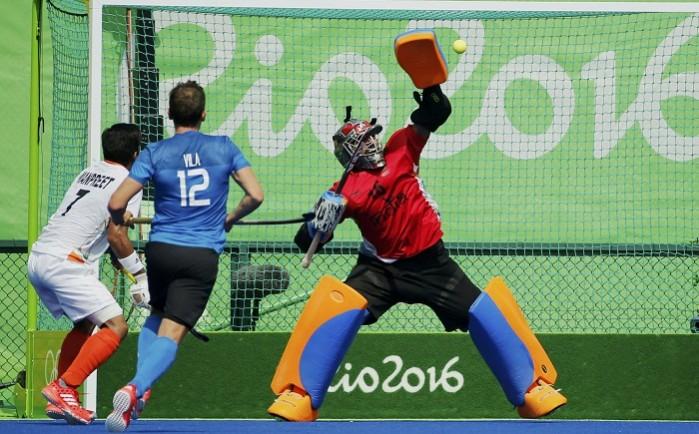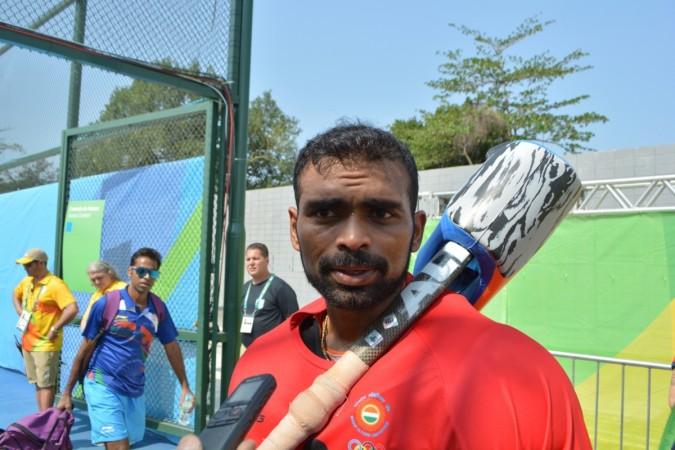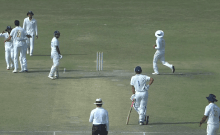
The current Indian hockey team is full of talented youngsters. But no team can survive without the wisdom that only experience brings. PR Sreejesh is a repository of such wisdom apart from being one of the finest goalkeepers in the World.
The Arjuna Awardee who has served the Indian team for more than a decade has seen the team go through thick and thin over the years but has stood constantly and defiantly as a reassuring presence in the Indian goal post. In this exclusive interview with Akshay Saraswat of International Business Times, India, the 33-year old veteran talks about the challenges of a goalkeeper and of his team as it seeks to regain glory of old days.
In the last year, your team has faced some big disappointments – losses in the World Cup quarter-final, in the Asian Games semi-final and in the final of Sultan Azlan Shah Tournament. How do you and your team recover from such setbacks?
Sreejesh: The World Cup was a bigger disappointment than the Azlan Shah because the latter was more of a preparatory tournament for us before the FIH Series Finals. Also, the experience of losing in the World Cup was more painful for us because everyone had worked really hard throughout the year. We spent one year preparing for the big event.
But it sometimes happens that you are unlucky and you get to play a tougher team in the knockouts. The team that we lost to (Netherlands), ended up as runners-up. The team we drew against (Belgium) in the group stage eventually became the World Champions. It's not that it was a bad day but a day where we got a better opponent.

You can react to the situation in two ways: You can be disappointed about the performance or you can take the positives from it. If you look at the team that played in the World Cup, majority of the players were youngsters. That experience of playing in front of your own crowd, playing in a crucial match and the disappointment, all that experience is going to help us throughout this year and the next.
This year, we are going to play one more crucial event – the Olympic qualifiers – and next year, the big one - Olympics itself – is coming up. Prior to that, all these negative things can be turned into a positive. We can learn from that and perform much better in the upcoming tournaments. That is going to be crucial for us.
The assistant coach of your team at the moment, Chris Ciriello, was a drag-flicker that you faced many times in your career as an opponent. Now that he is working with you, how is the chemistry between you two?
Sreejesh: When you are playing against someone as an opponent, they always analyse what your strengths and weaknesses are. Chris, now as our penalty corner coach, trains with our drag-flickers and I always have a conversation with him about what he used to think when he faced me.
"What you felt was my weak point and how to get rid of that" – asking those type of questions and getting those kind of inputs is always good for us and vital for me. That's because whenever I faced opposing teams, they always planned something especially for me. They would look at Australia, how they scored against me and take cues from that.

They have their own plans. When you get an opponent's view, then you can definitely work on your weaknesses. Through the drag-flickers, it's quite easy to find out goal-keeper's mistakes. This is what we do with Chris.
Also, he has got enough experience of playing in not just major events, but crucial matches like Olympic semi-finals, World Cup finals, Champions Trophy finals, etc. He scored goals in crucial moments in those sort of matches. That experience and those insights are really valuable for the youngsters, those who are working under him as drag flickers. They can learn and improve themselves and mentally prepare for the bigger challenges.
You were also the captain of the team at one stage. Usually captains tend to be midfielders or, sometimes, forwards. How challenging is it for a goalkeeper to lead the team?
Sreejesh: On the field, captaincy doesn't influence anyone. Because everyone on the field has to take lead for themselves and take responsibility. You can't influence any player during the game. When you are having the ball, you have to take the decision. As a second party, I cannot guide them. I can guide before or after receiving the ball but not when you are in possession of it.
So, it's your own decision and you need to make that play. You are your leader and you are your captain. That's how you need to think. Compared to other sports, in hockey, captaincy mostly works off the field, because that's where you need to keep the team united and have to look after them. You need to sort out all the issues with the team members and keep them happy and keep them in a fresh note for coming matches. So, on the field, it's the responsibility of all players to give 100 percent effort and take up their responsibility.

In the FIH Series Finals, your team played in a very attacking manner. But there were times when it seemed vulnerable against counter attacks as a lot of space was given to the forwards of the opposition. Did that bother you?
Sreejesh: No, no. There is a lot of difference between that tournament and the upcoming events. In the FIH Series Finals, we were playing against low-ranking teams. Their game strategy is totally different compared to ours.
If you look at the score-line, we were doing very well. So, that was a time when everyone felt that we can manage things in this way. That is how we managed to win by big margins. We gave less importance to the defence because we were scoring a lot of goals. That is what happened in the FIH Series Finals.
Definitely we need to have some experience like this: getting counter attacks, getting more PCs. So, you can look at it both ways. You can look at it as a negative but you can also take it as something positive. I think, in this camp, we are looking after our defence. We are sharpening our defence as we have got a bunch of experienced defenders. We also have penalty corner specialists and forwards.

There is a new system of penalty shootouts in place now. As a goalkeeper, you must be happy as this system gives a better opportunity to goalkeepers to succeed. How much do you practice and prepare for it?
Sreejesh: If you look at the old system, I always believed that it was 99% in favour of the striker. The goalkeeper only had a 1% chance of saving the goal. But now, it's an equal battle but still the advantage goes to the player because he gets eight seconds. He can take as many shots as he wants.
But it gives us an opportunity. I think it is 45:55 in favour of the strikers. So, they still get an advantage but we have a good opportunity to succeed also. During the camp days, twice a week, we train for the shootouts. Probably, this is where the goalkeeper's mind-set is important. The experience matters, the management of pressure matters and mental strength matters. So, we need to keep working on that. Just practice is not sufficient. You need to experience the shoot-out in a match, during a tournament. That is going to help you improve.
Who is the most difficult striker you have faced in penalty shootouts?
Sreejesh: Everyone! Everyone's got a different talent. Somebody merely pushes the ball to get a goal, somebody hits the ball at 175 km/h speed to score and some people don't do either to score a goal. All the forwards have got their own talents and everyone has their own way of scoring.
















